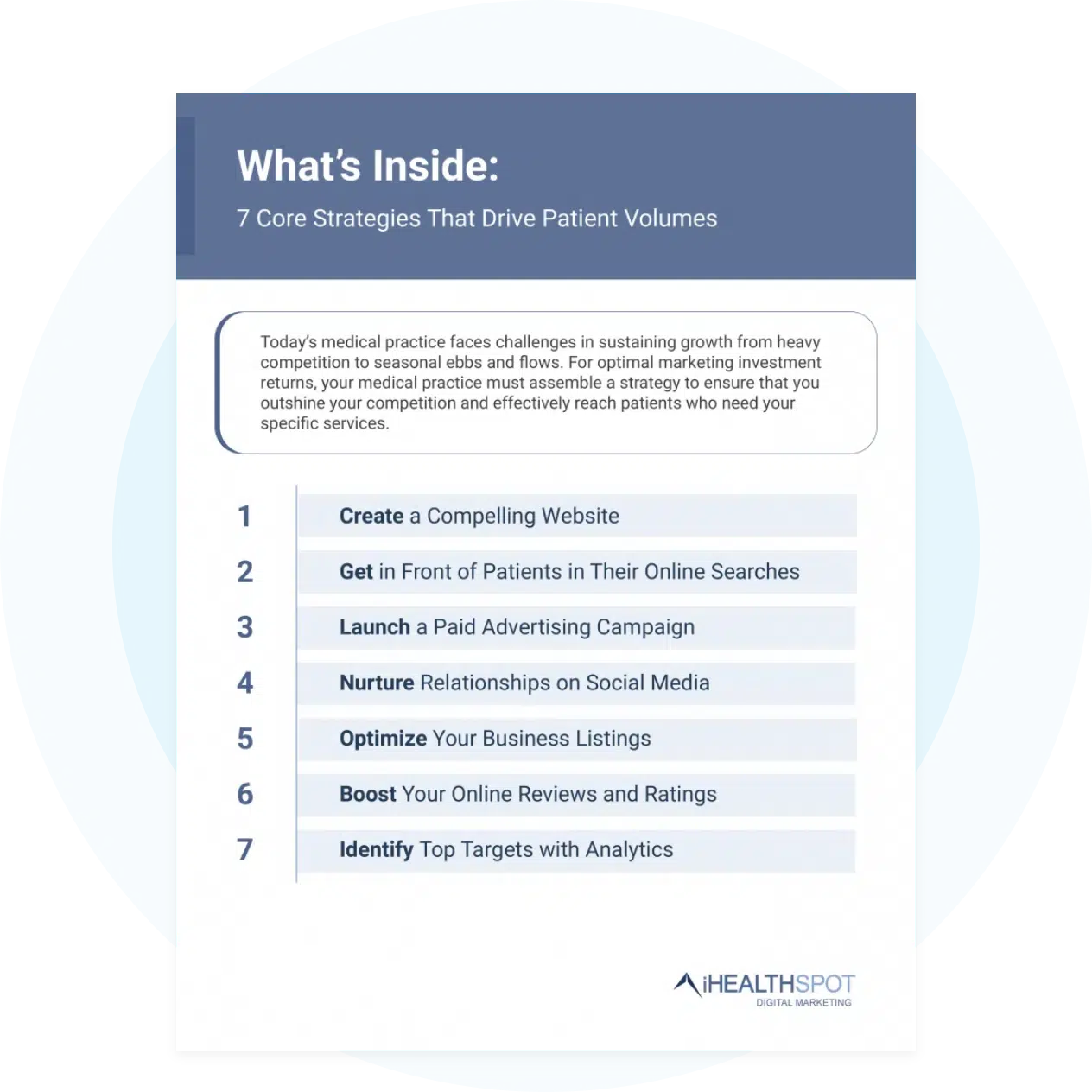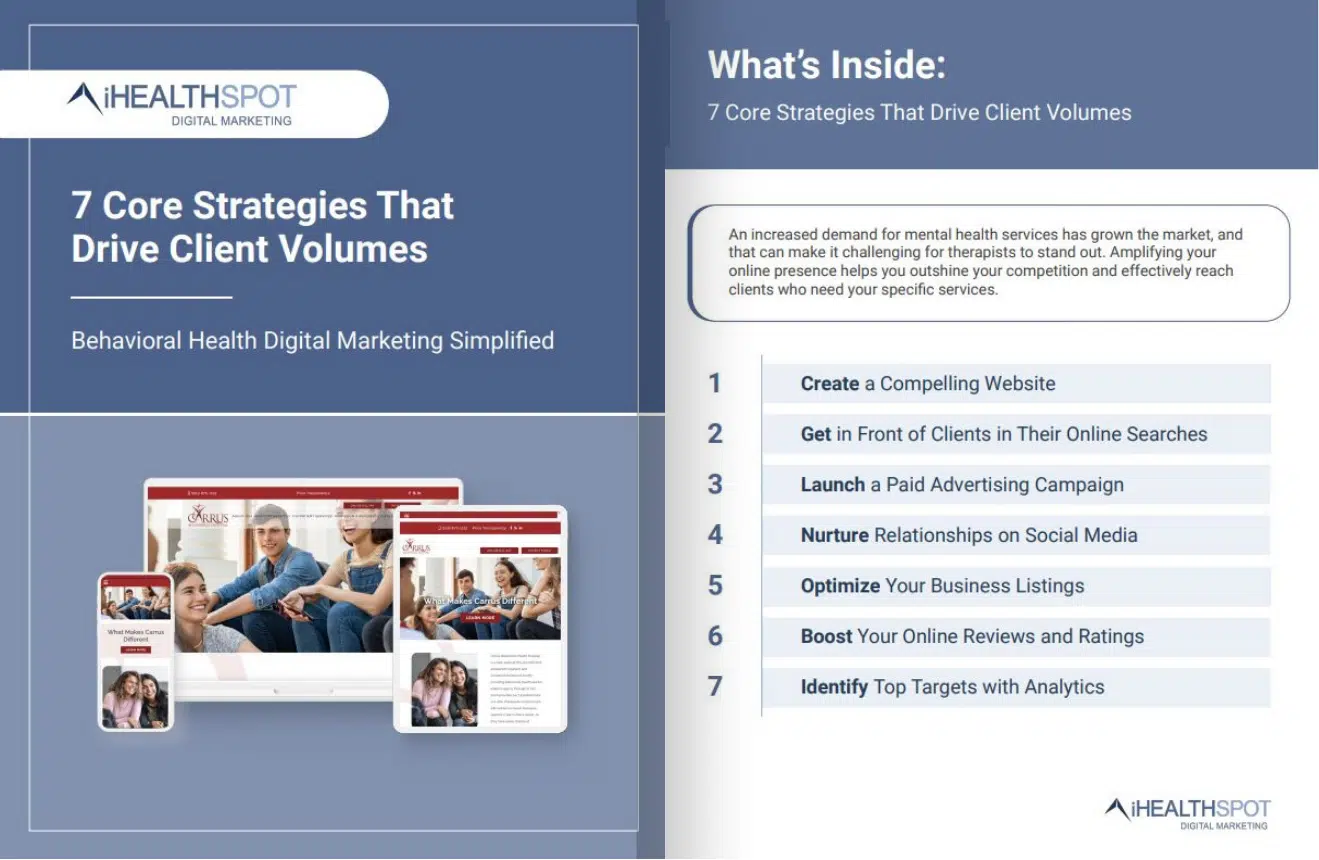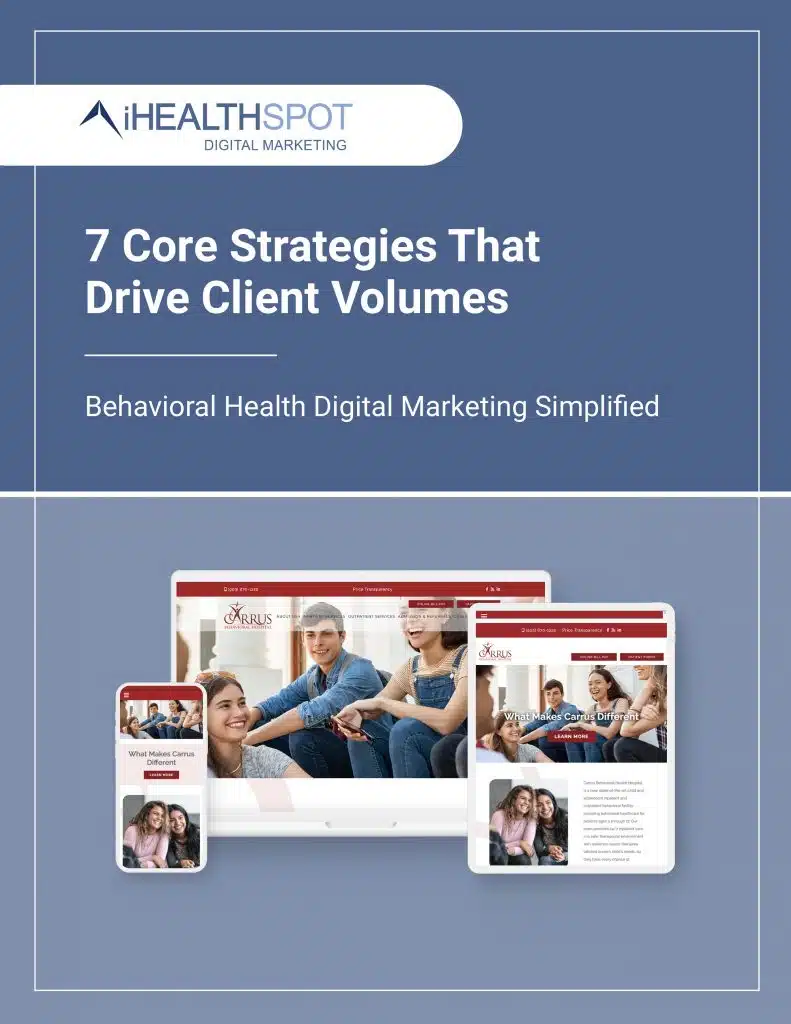DIGITAL MARKETING FOR THERAPISTS
MARKETING FOR THERAPISTS: THE ULTIMATE 7 STEP GUIDE
When people are ready to reach out for mental health services, your digital outreach needs to be there to meet them. As a lighthouse guides ships to safety in the darkest of storms, digital marketing for therapists is the beacon that steers them to your care. Your online presence gives them a sense of how well you understand their circumstances, even before they step foot in your office or log in to a video call. Our guide will help you establish this trust digitally, creating a bridge to your accessible and convenient mental health services.


THE BEST THERAPIST MARKETING STRATEGY GUIDE FOR YOUR PRACTICE
Your therapy practice may already have some active digital marketing, such as a website. But how do you take your existing digital assets and make them work to their full potential? Download the guide to learn how to leverage the power of digital marketing tools to position yourself as the best choice for therapy.
Our guide encompasses various aspects of marketing for mental health services, including establishing a compelling online presence and harnessing the power of digital advertising to generate new leads. Explore techniques to enhance website engagement and effectively utilize social media to connect with your target audience.
GET YOUR MARKETING STRATEGY FOR MENTAL HEALTH SERVICES TODAY
There are countless courses, books, blogs, and tutorials on digital marketing for mental health professionals, but our guide distills it all down to a few pages. It offers practical tools and strategies to enhance your image as a reputable therapist, boost new client acquisition, and stimulate engagement. With our guide, you'll confidently and effectively traverse the behavioral health digital landscape.
- The elements of web design that impress potential patients and promote a satisfactory patient experience such as ease-of-use on mobile devices
- How to draw more potential patients to your mental health services site through better rankings generated by search engine optimization (SEO)
- How digital advertising opportunities (pay-per-click, or PPC), like ads on Google and Facebook can supercharge patient acquisition
- How social media engagement will reinforce your therapy brand and build credibility
- Why optimizing your Google Business Profile is indispensable for local SEO, with your listing attracting potential patients and increasing visibility in your local area
- Why online reviews are the most effective way to convince healthcare consumers to choose your practice over the competition
INSIGHTS YOU’LL GAIN THROUGH THIS FREE GUIDE
Learn everything you need to know about marketing your medical practice. Starting with your website and ending with booked appointments, this guide has everything you need to know.
1
What a medical website needs to have for a favorable patient experience that makes a great first impression
2
How to transform your website into a patient traffic magnet through search engine optimization (SEO) and content marketing
3
Paid advertising (pay-per-click, or PPC) equalizes search visibility between your competitors through premium placement
4
Social media’s role in reinforcing your medical practice’s presence online
5
The free tool that is a game changer in local search results: Google Business Profile
6
How patient online reviews are pivotal for the success of your digital marketing strategy
Download Your 7 Step Strategy Guide Now
Find out how to bring more visitors to your website, and how to make your website effective in capturing new patient interest.

DEVELOPING A THERAPIST MARKETING STRATEGY FOR YOUR CLINIC
A robust marketing strategy is indispensable for therapists. Our comprehensive guide simplifies marketing for mental health professionals into manageable steps, encompassing vital aspects such as website optimization, engagement strategies, digital advertising, social media marketing for therapists.
This guide is not a class on digital advertising. Instead, it simplifies digital marketing to get you up to speed on how online marketing for mental health professionals works in the current market.
Enhancing your digital marketing efforts could be the most impactful business decision you make this year. Download our comprehensive guide to learn what tools you need to unlock steady growth.
ABOUT iHEALTHSPOT: YOUR MARKETING AGENCY FOR THERAPISTS
iHealthSpot partners with healthcare businesses (and only healthcare businesses) from coast to coast. Backed by many years of experience in digital marketing best practices, our signature solutions drive practice growth, patient engagement, and ultimately, practice revenue. Our diverse client base includes independent medical practices, specialists, multi-specialty clinics, groups, large organizations, and private equity firms. Our marketing strategies for therapists are designed to help behavioral health providers thrive in the healthcare market by reaching more patients with an engaging online presence.
Every day, our teams support our:
- Track record of healthcare digital marketing success through our therapy marketing services
- Award-winning web design, designed to convert patients and promote patient loyalty
- Comprehensive, and data-driven marketing plans based on market intelligence that optimizes campaign performance
- Accountability for results through marketing support and monthly reporting
Download Your 7 Step Strategy Guide Now
Find out how to bring more visitors to your website, and how to make your website effective in capturing new patient interest.
Explore Our Other Resources

URGENT New Google Click-To-Call Terms (And HIPAA Concern)
Filed Under: Hedy & Hopp’s Podcast
A new development from Google could pose serious HIPAA compliance risks for healthcare marketers. In a recent We Are, Marketing Happy podcast episode from Hedy & Hopp, Jenny covers that the platform now requires advertisers to opt into call recording for its Click-to-Call feature, potentially leading to the recording of PHI or PII. This episode
Read More
Recap of HCIC24
Filed Under: Hedy & Hopp’s Podcast
In a previous podcast episode on We Are, Marketing Happy, Jenny welcomes Hedy & Hopp team members Shelby Auer, an Account Manager, and Taylor Fedderke, Marketing Manager, as they share insights from their experience at HCIC24 in Austin. The conference’s central downtown location, combined with great food, created the perfect backdrop for networking and exploring
Read More
AI Video and Image Editing 101
Filed Under: Hedy & Hopp’s Podcast
In We Are, Marketing Happy’s recent podcast episode, Jenny Bristow, CEO of Hedy & Hopp, chats with Drew Hardesty, President and CEO of Wonder Boy Media, about how AI is changing the game for video and image editing in healthcare marketing. They dive into how AI tools are helping marketers save time, spark creativity, and
Read MoreFrequently Asked Questions About Therapy Marketing
The more questions you ask during the process of your therapy marketing strategy planning, the better. Below are the inquiries we hear most frequently from therapy practice managers.
Marketing yourself as a therapist involves a combination of strategies. Firstly, you need to establish a strong online presence through a professional website that clearly communicates your services, expertise, and compassionate approach to therapy. Social media platforms can be used to engage with your target audience, share valuable content, and build your professional network. SEO (search engine optimization) is also crucial in ensuring your website is easily discoverable by potential clients. Lastly, consider using online advertising such as Google Ads to reach a broader audience.
Google Ads can be an effective tool for therapists. They allow you to target specific demographics, locations, and even times of day, ensuring your ads reach those who are most likely to need your services. For paid campaigns to be most effective, behavioral health practices should use relevant keywords and create compelling ad copy to encourage prospective clients to click on your ad.
Ultimately, the best platform for advertising as a therapist will depend on your unique circumstances and the preferences of your target audience. It's often a good idea to combine several platforms to reach a broader audience and assess which ones provide the best results for your practice. Many therapists use the power of social media videos to introduce their knowledge about specific topics in mental health care.
Absolutely! Feel free to explore some of our related marketing strategy guides and resources: Marketing Strategy For Medical Practices | Marketing for Dermatology | Marketing for Plastic Surgery
Download Your 7 Step Strategy Guide Now
Find out how to bring more visitors to your website, and how to make your website effective in capturing new patient interest.













